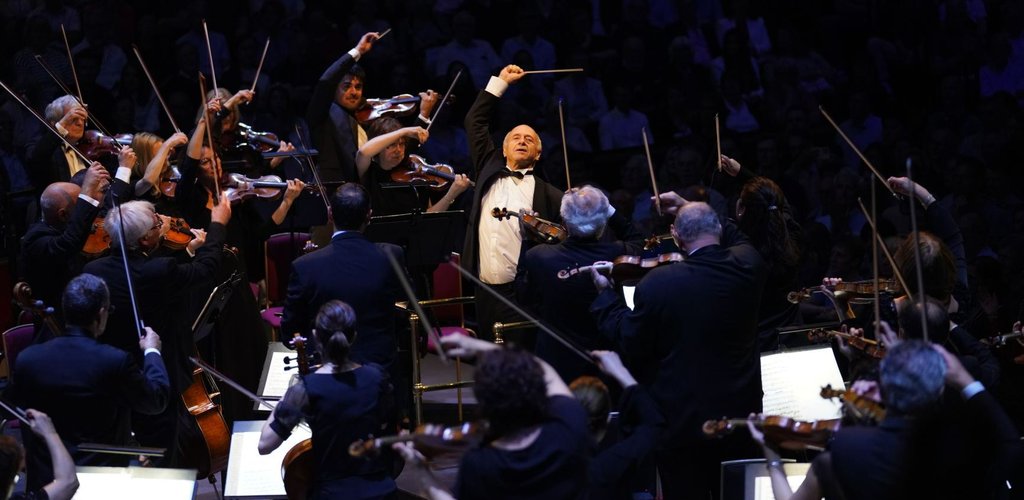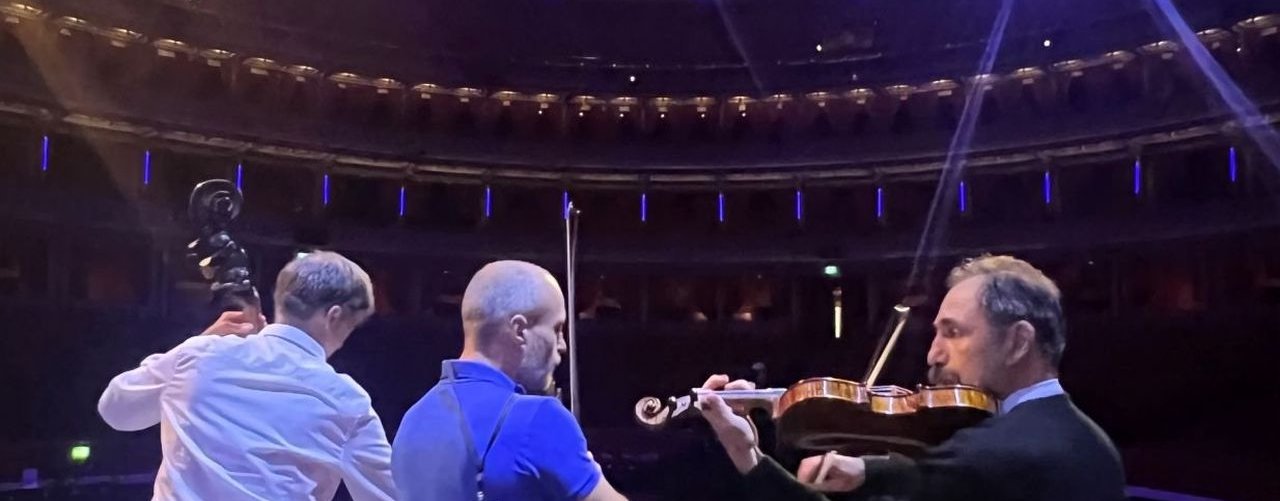“There is something about how they play, the visceral, physically dynamic way they move as one, that turns a concert into a communal act for orchestra and audience,” wrote the Guardian after the Budapest Festival Orchestra’s London shows. The Edinburgh Music Review applauded the BFO’s first local appearance, featuring two concerts in one night, as “riotously good clean fun.”
Nicola Benedetti, the recently appointed artistic director of the Edinburgh International Festival, has introduced the institution of the resident orchestra, and she invited the Budapest Festival Orchestra to be the first ensemble to take on the role. As a result, the BFO gave four concerts in Usher Hall (August 8th, 9th, & 10th), and, responding to Benedetti’s questions during the first one, Iván Fischer demonstrated and elaborated on the way he envisions the future of classical orchestras. The BBC Proms invited the BFO to join its lineup for the first time since 2018, and the orchestra filled the 6,000 seats of the Royal Albert Hall three times within two days (August 12th & 13th).
The audience of both tour locations was able to experience the whole spectrum of the BFO’s musical range. In Edinburgh, they brought to life the Midnight Music format that is so popular in Hungary, and the programming of one of their London concerts was choreographed by the Audience Choice method. “And while the librarian scurried around doling out the music, the crowd was entertained with Hungarian jazz, klezmer and even orchestral musicians singing a Monteverdi madrigal. Now, there’s versatility,” – writes the Guardian. Even the more traditional, typically Hungarian program of the tour concerts had a surprise element: Bartók’s Seven Choruses with Orchestral Accompaniment was rendered by the National Youth Choir of Scotland (NYCOS). The Scottish girls’ choir learned the songs in Hungarian and performed them off book, “with flawless precision,” according to the Scotsman.
The international press also commended Iván Fischer’s skills as a conductor, music educator, and showman. The Edinburgh Music Review calls him a “magician [...] a man for whom the word charismatic was invented.” The Arts Desk reminds us that “Fischer is never one to take the easy option if he can do something extra-creative instead.” The Hungarian edition of Forbes, which accompanied the orchestra on two tour locations, didn’t shy away from calling the founder “the Mick Jagger of conductors.”
András Schiff joined three concerts as a piano soloist, one in Edinburgh and two in London. “It is hard to imagine a more convincing impression of old friends enjoying each other’s company than the musical interaction between Schiff and Fischer,” declared Bachtrack, while the Guardian observed “a keen rapport between conductor, orchestra and soloist, it was like old friends sharing a vintage wine.”
In addition to Schiff’s exceptional display, the reviews sang the praises of Anna-Lena Elbert, the young German soprano who performed three songs from a György Ligeti opera. Several section leaders of the BFO were also highlighted by name. The Telegraph applauds the clarinet skills of Ákos Ács and the flute solo by Anett Jóföldi in Bartók’s Piano Concerto No. 3, also celebrating the expressive power of the horn section in various complex pieces. The Edinburgh Music Review was delighted to recall the moment when “one of the world’s greatest virtuoso violinists, Nicola Benedetti, [was] mesmerized by [István Kádár’s violin] playing.” Joined by two stage partners, Kádár presented an authentic version of Hungarian folk dances from Transylvania, as an overture to the full orchestral performance of the Bartók piece.
Like being jolted out of your seat by thunderbolts
The last piece of the concert series was Beethoven’s Eroica symphony, which brought down the house both in and outside the passionate arena of the Royal Albert Hall. The Evening Standard celebrated Fischer’s unique approach, which is able to bring forth the “strengths of an orchestra renowned for its voluptuous, soft-grained textures.” The Financial Times found the performance “impressive ... it must be some years since the BBC Proms heard an Eroica as distinguished as this.” The Telegraph lauded the “orchestral glow,” which lent the piece an “epic but still exciting breadth.” In an attempt to describe the “electrifying” performance, the critic of Bachtrack admits he “was jolted out of his seat by the opening thunderbolts, and was then held prisoner by electrodes attached to all the places susceptible to the joys of electrons.”
Upon returning from the tour, the orchestra withdrew to the studio to record Beethoven’s Symphony No. 3, which will be available next year. However, we can hear the BFO perform Eroica much sooner, on September 2nd at the free open air concert at Heroes’ Square to celebrate the 150th birthday of Budapest.
You can listen to the three concerts the BFO performed at the BBC Proms using the links below:

